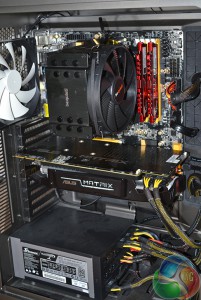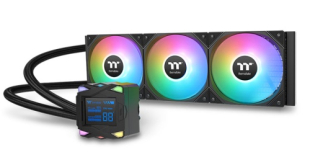Thermal Performance Test Procedures:
- Idle temperatures are obtained after sitting at the desktop for 15 minutes.
- Load temperatures are obtained after running Prime95 in the ‘Small FFTs' mode for 15 minutes.
- We tested with our CPU set at 3.9GHz (typical multi-core turbo speed of most motherboards) using a BIOS-set voltage of 1.200V (in the region of most common MCT voltages).
- We repeated testing with our CPU overclocked to 4.5GHz (45x multiplier, 100MHz base clock) using a BIOS-set voltage of 1.325V.
- The cooler's fan is set to 100% to eliminate inaccuracies due to dynamic PWM fan speed adjustments.
- The supplied thermal paste is used to provide an accurate interpretation of the cooler's out-of-the-box performance.
- We use HWMonitor to measure the CPU temperature.
- CPU temperature recording is accurate to +/- 0.5°C. Ambient temperature recording is accurate to +/- 0.05°C.
- Ambient temperature was maintained at 22°C.
Acoustic Performance Test Procedures:
- We measure the noise output of our entire system from a distance of 1m while the CPU cooler's fan operates at 100% (indicating the maximum noise output).
- We set the case fans to minimum speed (hence noise) and avoid using a discrete GPU to isolate the CPU cooler's noise output.
Test System:
- Processor: Intel Core i7 4770K Retail (3.9GHz forced turbo and 4.5GHz OC).
- Motherboard: ASRock Z87 OC Formula.
- Memory: 8GB (2x 4GB) G.Skill RipjawsX (F3-2133C9Q-16GXL) 2133MHz 9-11-11-31.
- Graphics Card: Asus R9 280X Matrix Platinum 3GB.
- System Drive: 500GB Samsung 840 Series SSD.
- Case: NZXT Phantom 630.
- Power Supply: Seasonic Platinum 1000W.
- Thermal Paste: Supplied Corning TC-5121 thermal paste.
Comparison Coolers:
- be quiet! Dark Rock Pro 3.
- Noctua NH-D14.
- Corsair H100i.
Software:
- CPUID HWMonitor.
- Prime95.
- Windows 7 Professional with SP1 64-bit.
 KitGuru KitGuru.net – Tech News | Hardware News | Hardware Reviews | IOS | Mobile | Gaming | Graphics Cards
KitGuru KitGuru.net – Tech News | Hardware News | Hardware Reviews | IOS | Mobile | Gaming | Graphics Cards



